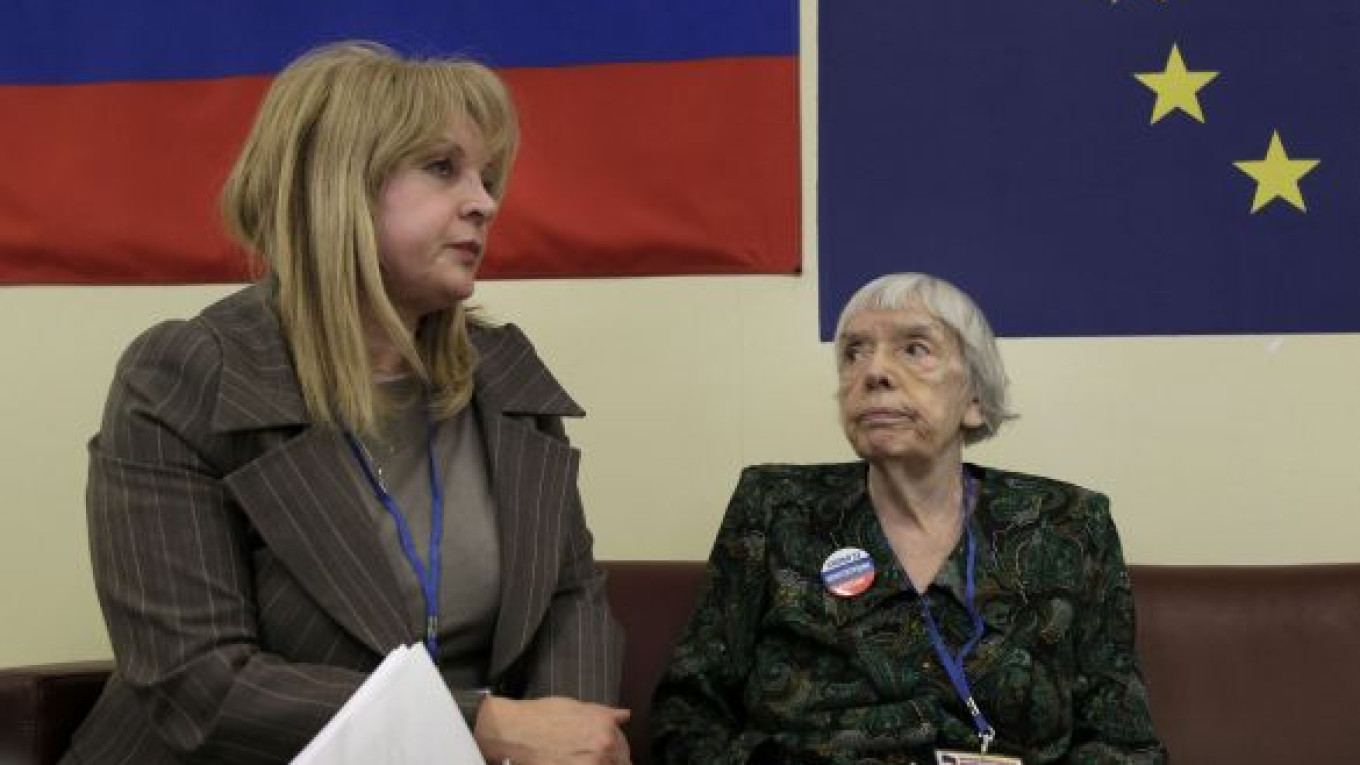Despite President Dmitry Medvedev’s promises, the life of the country’s human rights workers is growing increasingly dangerous, making Western protection necessary, activists said Tuesday.
“Our people are being killed and injured and none of us knows who will be next,” veteran human rights campaigner Lyudmila Alexeyeva told a European Union conference in Moscow.
She said the fastest and most effective outside help was to give visas and political asylum to those whose safety was at risk. “We very much ask for such a mechanism to be set up,” she said.
Alexeyeva, who chairs the Moscow Helsinki Group, recalled that last year there were killings of a number of activists, including lawyer Stanislav Markelov, Novaya Gazeta journalist Anastasia Baburova and Ingush opposition leader Maksharip Aushev.
She also said it was important that the Russian government be pressed into implementing decisions by the European Court of Human Rights. She complained that Russia pays compensation to victims but rarely enacts changes to prevent future violations.
Conference participants accused the government of not fulfilling its obligation to protect human rights workers.
“The only protection they get is from society and from parts of the media,” said Andrei Vyurov, a member of the Moscow Helsinki Group.
Yury Dzhibladze, head of the Center for Development of Democracy and Human Rights, said nothing has improved since President Medvedev first acknowledged a year ago that a new policy toward human rights activists was needed. “Everything has just gotten worse,” he said.
Perhaps one reason for this is that many officials see human rights activists as enemies, Dzhibladze said. “They do not understand that it is the state’s duty to protect them,” he said.
But Alexander Zimin, a lecturer at the Interior Ministry’s Management Academy, said change was ongoing. “Serious steps are being taken to end the notion that they are enemies,” Zimin said.
He said the ministry has published in recent years two booklets on relations between police and civil society. He acknowledged, however, that the current situation is far from satisfactory for activists.
Academy teachers served as the only representatives from law enforcement agencies at the conference.
Marianna Maximovskaya, who chaired the conference at the EU Delegation’s headquarters, said officials from the Interior Ministry and Prosecutor General’s Office had declined invitations.
Presidential human rights commissioner Ella Pamfilova told the conference that a lack of functioning democratic institutions and widespread corruption were the two main reasons why little progress has been achieved.
She also said the main risk for human rights activists did not come from law enforcement agencies. “The biggest danger is from politicians, from their spin doctors, and from people with criminal links,” she said.
The situation is most precarious in the North Caucasus, especially in Chechnya, where rights campaigners Natalya Estemirova and Zarema Sadulayeva were killed by unknown attackers last year.
Allison Gill, head of the Moscow office for Human Rights Watch, said it was increasingly difficult to obtain good research and analysis from the region. “We have to review very carefully anything we get from the North Caucasus because there are fewer sources,” she told The Moscow Times on the sidelines of the conference.
Heidi Hautala, chairwoman of the European Parliament’s Human Rights Subcommittee, said EU institutions must cooperate more to protect activists in Russia.
In a message read out at the conference, the Finnish lawmaker said the idea of a strategic partnership with Russia, popular with some European leaders, should not be employed under the current circumstances. “This is only possible if both partners share common values,” she said.
Hautala acknowledged that EU member states “sadly disagree on priorities” with Moscow. “We must develop strategies to bring human rights to the core of EU-Russian relations,” she said.
A Message from The Moscow Times:
Dear readers,
We are facing unprecedented challenges. Russia's Prosecutor General's Office has designated The Moscow Times as an "undesirable" organization, criminalizing our work and putting our staff at risk of prosecution. This follows our earlier unjust labeling as a "foreign agent."
These actions are direct attempts to silence independent journalism in Russia. The authorities claim our work "discredits the decisions of the Russian leadership." We see things differently: we strive to provide accurate, unbiased reporting on Russia.
We, the journalists of The Moscow Times, refuse to be silenced. But to continue our work, we need your help.
Your support, no matter how small, makes a world of difference. If you can, please support us monthly starting from just $2. It's quick to set up, and every contribution makes a significant impact.
By supporting The Moscow Times, you're defending open, independent journalism in the face of repression. Thank you for standing with us.
Remind me later.


